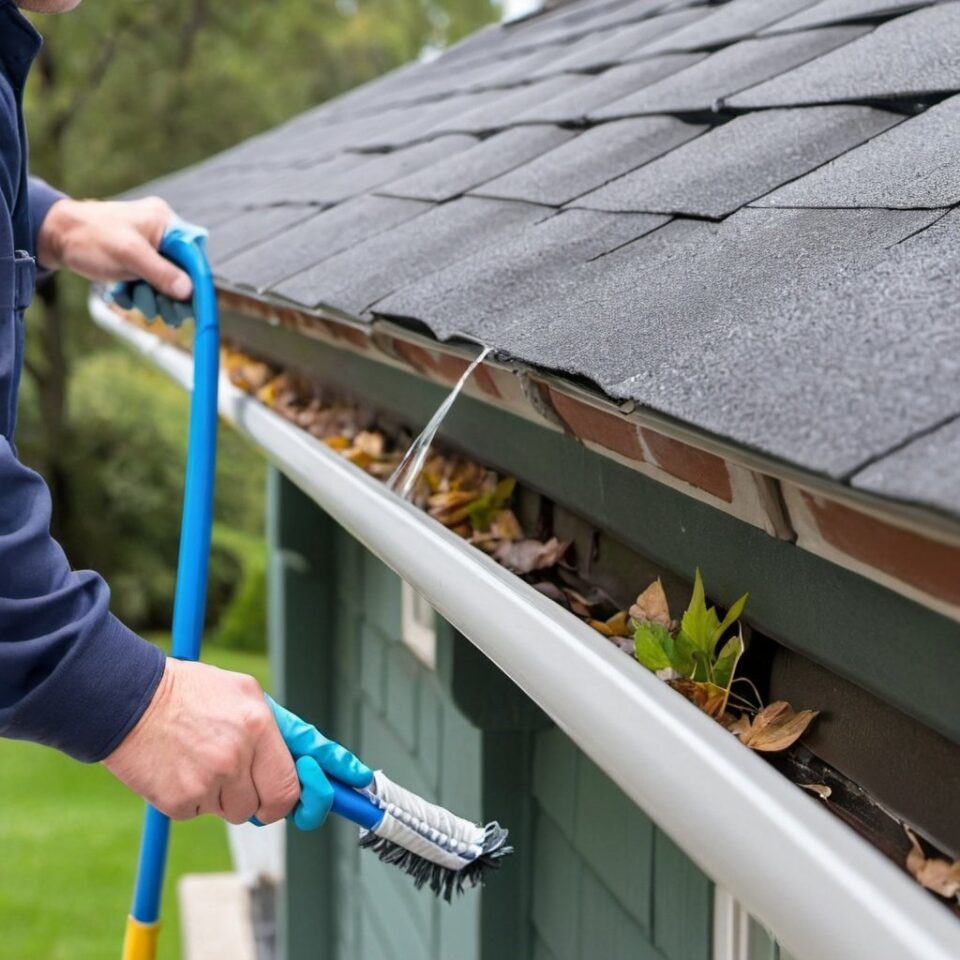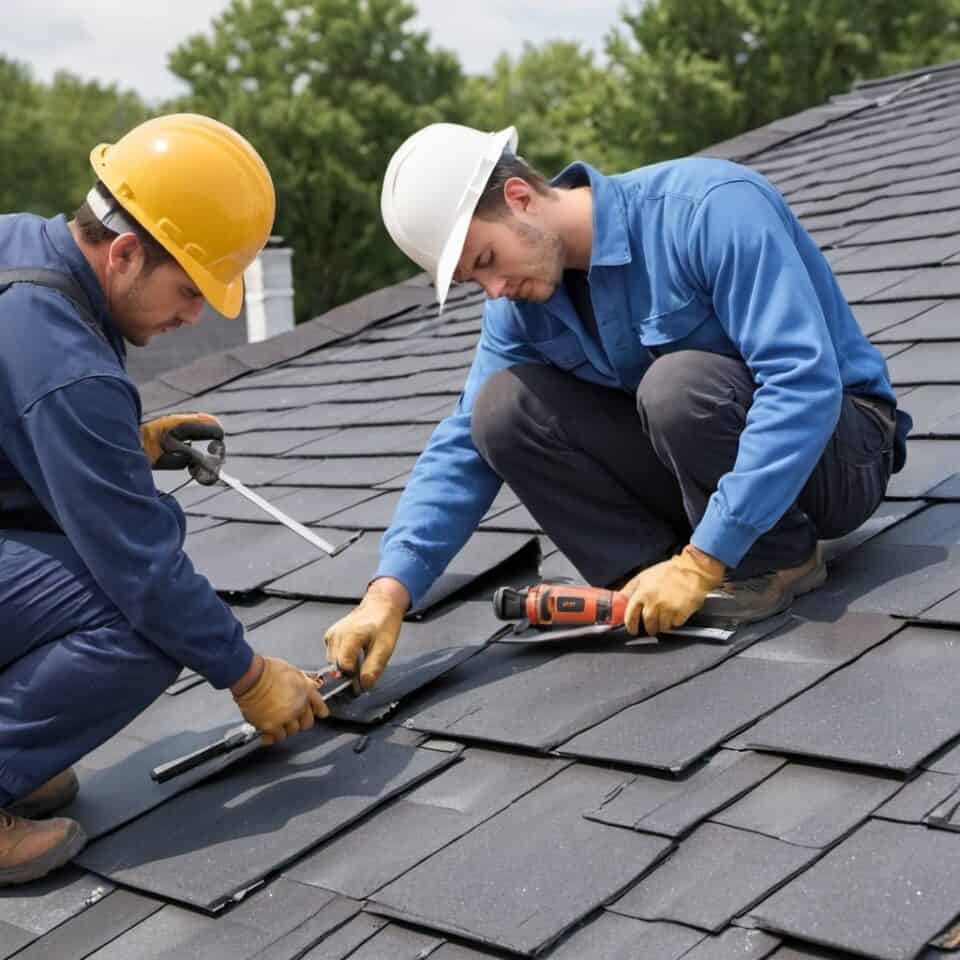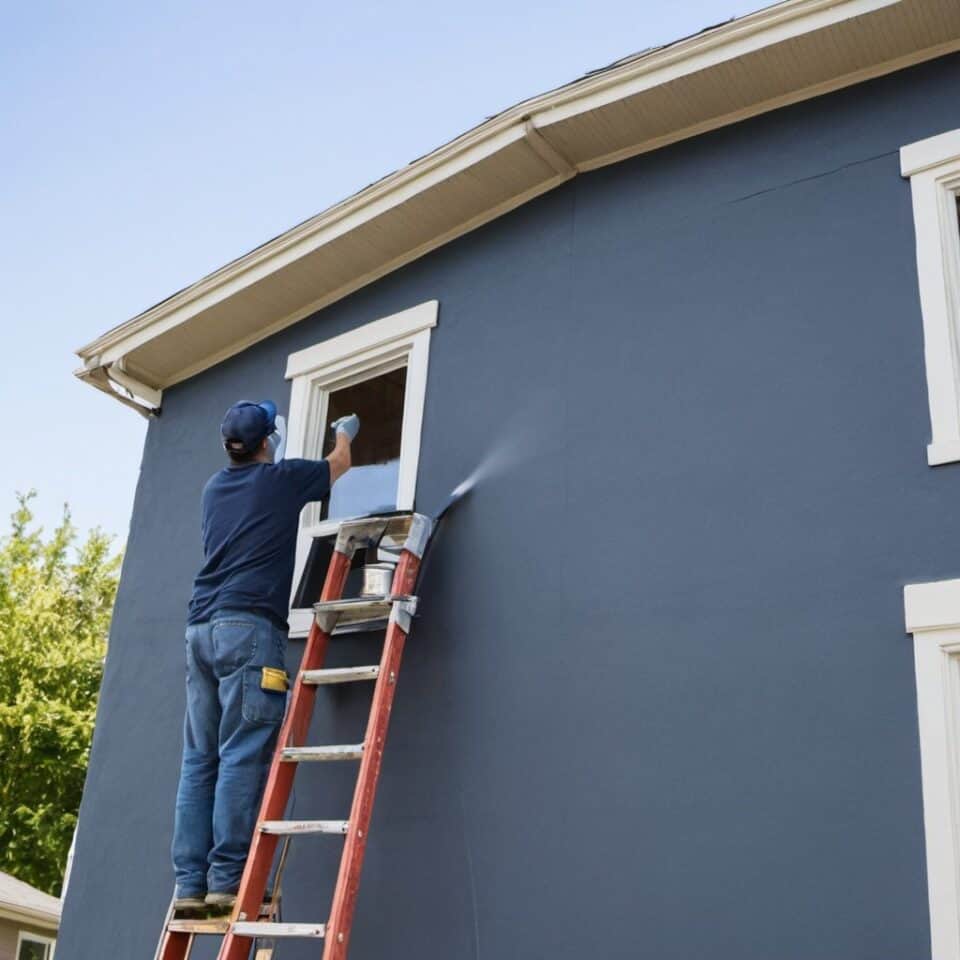Are you considering a roof replacement but unsure about the cost? Understanding the factors that contribute to the overall expense can help you make an informed decision. From the type of shingle to the size of your house, various elements influence the final price tag. In this essential guide, we’ll break down the key factors and provide you with insights to help you estimate the cost to replace your roof.
Key Takeaways:
- The average cost of a new roof is $10,000, with projects typically ranging from $8,500–$14,300.
- Factors such as the type of shingle, labor costs, location, and roof size affect roof replacement costs.
- The cost of shingles or materials can vary, with options ranging from basic asphalt shingles to more expensive choices like copper tiles.
- Larger houses with bigger roofs generally require more materials and labor, resulting in higher replacement costs.
- Geographic location can also impact the price, as factors like weather conditions and the cost of living vary from place to place.
Factors That Affect Roof Replacement Costs
When it comes to replacing your roof, there are several factors that can influence the overall cost. Understanding these factors can help you make informed decisions and budget accordingly for your roof replacement project.
One of the primary factors affecting roof replacement costs is the type of shingle or material you choose. Basic asphalt shingles are the most affordable option, starting at $4.25 per square foot, while more premium materials like slate or copper can significantly increase the cost. Consider your budget and desired durability when selecting the right shingle or material for your roof.
Another significant factor is labor costs, which typically make up 60% of the total cost. The complexity of the job, accessibility of your roof, and the time required for installation can all impact the labor costs. Additionally, your location can also affect the overall price, as labor rates can vary in different regions.
Here’s a table showcasing the average cost per square foot for different types of roofing materials:
| Roofing Material | Average Cost per Square Foot |
|---|---|
| Basic Asphalt Shingles | $4.25 |
| Metal | $7.50 |
| Wood Shake | $8.75 |
| Slate | $15.00 |
| Copper | $25.00 |
In summary, factors such as the type of shingle/material and labor costs can significantly impact the cost of replacing your roof. Consider your budget, location, and desired durability when making decisions about your roof replacement project.
Roof Replacement Cost by House Size
The size of your house and roof can have a significant impact on the cost of a roof replacement. Generally, larger homes with bigger roofs will require more materials and labor, leading to higher costs. To give you an idea of the price range, a roof replacement for a 1,000 square foot house typically costs between $4,500 and $6,000. On the other hand, a 3,000 square foot house can have a roof replacement cost ranging from $13,500 to $18,000.
It’s important to note that these figures are just estimates and the actual cost can vary depending on several factors. These include the complexity of the roof design, the type of materials chosen, and the labor rates in your area. Additionally, if there are any special considerations such as multiple roof levels or architectural features, it can further impact the overall cost.
To get an accurate estimate for your specific case, it’s recommended to consult with a professional roofing contractor. They will assess your house size, roof condition, and other relevant factors to provide you with a detailed quote. This will help you plan and budget for your roof replacement project accordingly.
| House Size | Estimated Cost Range |
|---|---|
| 1,000 square feet | $4,500 – $6,000 |
| 2,000 square feet | $9,000 – $12,000 |
| 3,000 square feet | $13,500 – $18,000 |
Table: Estimated roof replacement cost range by house size
Roof Replacement Cost by Location
When it comes to replacing your roof, the cost can vary depending on your geographic location. Factors such as local weather conditions and the cost of living in your area can impact the price you can expect to pay. To give you an idea of the price range across different locations, here are a few examples:
| City | State | Price Range |
|---|---|---|
| Phoenix | Arizona | $6,305–$8,047 |
| Dallas | Texas | $6,336–$8,057 |
| Miami | Florida | $8,135–$10,358 |
These prices give you a general idea of what you might expect to pay, but keep in mind that they can vary based on factors unique to your specific location. It’s always a good idea to get quotes from local roofers to get a more accurate estimate for your particular situation.
Additionally, it’s important to note that the cost of a roof replacement is not solely determined by location. Other factors, such as the size of your roof, the type of shingle/material, and additional considerations, also play a role in the overall cost. Therefore, it’s essential to consider all these factors in conjunction with the location-specific pricing when planning your budget for a roof replacement.
Additional Roof Replacement Cost Considerations
When calculating the cost of a roof replacement, it’s important to consider more than just the price of materials and labor. There are several additional factors that can impact the overall cost of a roof replacement project. These include:
- The cost of removing the old roof: Before a new roof can be installed, the old roof needs to be removed. This process can add to the overall cost, especially if the old roof has multiple layers or is difficult to access.
- Repairing any damage underneath the old roof: In some cases, the underlying structure of the roof may have damage that needs to be addressed before a new roof can be installed. This can include issues such as rot, water damage, or weakened support beams.
- Additional roofing projects: When replacing a roof, it’s a good time to consider any other roofing projects you may want to tackle. This can include updating gutters, adding skylights, or installing a more energy-efficient roofing system.
These additional costs can vary depending on the size of your roof, the extent of the damage, and the specific projects you choose to undertake. It’s best to consult with a professional roofer who can assess your unique situation and provide a more accurate estimate of the total cost.
“Beyond the price of materials and labor, there are several other factors to consider when calculating the cost of a roof replacement. These additional costs can vary depending on the specific needs of your roof and the projects you choose to undertake.” – Professional Roofer
| Additional Roof Replacement Costs | Cost Range |
|---|---|
| Removal of old roof | $500 – $1,500 |
| Repairing underlying damage | $1,000 – $3,000 |
| Additional roofing projects | Varies depending on project |
By considering these additional factors and budgeting for them, you can ensure that you have a more accurate estimate of the total cost of your roof replacement project. It’s important to factor in these costs to avoid unexpected expenses and ensure that the final result is a roof that is not only functional but also aesthetically pleasing.
How to Reduce Roof Replacement Costs
When it comes to replacing your roof, there are several cost-saving strategies you can employ to help reduce the overall expense. By implementing these strategies, you can save money without compromising on the quality and integrity of your new roof.
1. Choose Cost-Effective Roofing Materials
One of the most effective ways to reduce roof replacement costs is by selecting cost-effective roofing materials. Consider the long-term durability, maintenance requirements, and overall lifespan of different materials before making a decision. Asphalt shingles, for example, are a popular choice due to their affordability, while metal roofs offer durability and energy efficiency.
2. Take Advantage of Offseason Discounts
Scheduling your roof replacement during the offseason can lead to significant cost savings. Many roofing companies offer offseason discounts or promotions to attract customers during slower periods. By planning your replacement during these times, you can enjoy lower labor costs and potentially negotiate better prices for materials.
3. Explore Insurance Claims and Warranties
If your roof replacement is a result of damage from a covered event, such as a storm or fire, check with your insurance provider to determine if you can file a claim. Insurance coverage can help offset some of the costs associated with your roof replacement. Additionally, be sure to explore any warranties that may be applicable to your existing roof or the new materials being installed.
4. Get Multiple Quotes and Research Roofers
Don’t settle for the first roofing contractor you come across. Take the time to get multiple quotes from reputable roofers in your area. Make sure to compare not only the cost but also the quality of materials, warranties offered, and the experience and qualifications of the roofing contractors. Researching and choosing the right roofer can help ensure that the job is done properly and efficiently.
By applying these cost-saving strategies, you can reduce the financial burden of a roof replacement while still receiving a high-quality, durable roof that will protect your home for years to come.
DIY vs Professional Replacement
When it comes to replacing your roof, you may be tempted to take on the project yourself in order to save money. While it’s possible to handle minor roof repairs, a full roof replacement is a complex undertaking that is best left to the professionals. Here’s why:
- Expertise and Experience: Professional roofers have the knowledge and experience to assess your roofing needs accurately. They can identify any underlying issues and recommend the best course of action. Their expertise ensures that the job is done correctly and efficiently.
- Safety: Roof replacement involves working at heights, which can be dangerous without the proper safety equipment and training. Professional roofers are equipped with the necessary safety gear and follow strict safety protocols to minimize the risk of accidents.
- Time and Efficiency: Roof replacement is a time-consuming process that requires careful planning and coordination. Professional roofers have the necessary tools, equipment, and skilled labor to complete the job efficiently. Hiring professionals saves you time and prevents the project from dragging on.
- Warranty and Insurance: Reputable roofing companies offer warranties on their workmanship and the materials used. This gives you peace of mind knowing that any issues that may arise in the future will be covered. Additionally, professional roofers carry liability insurance, protecting you from any potential damages or injuries during the project.
By hiring professionals, you ensure that your roof replacement is done right the first time, reducing the risk of future issues and damage to your home. So, while it may be tempting to tackle the project yourself, the benefits of hiring professionals far outweigh the potential cost savings.
Remember, your roof is one of the most important investments in your home. Don’t compromise its integrity by attempting a DIY approach. Instead, consult with a professional roofer who can provide the expertise and quality workmanship needed to ensure a successful roof replacement.
Conclusion
Replacing your roof is a significant investment, with costs ranging from $8,500–$14,300 on average. The final cost will depend on various factors such as the type of shingle/material, labor costs, location, roof size, and additional considerations. To make an informed decision, it is crucial to carefully consider all these factors and consult with a professional.
Factors that affect roof replacement costs include the type of shingle/material, labor costs, location, and roof size. Choosing the right roofing material, scheduling the replacement during the offseason, and exploring insurance claims or warranties can help reduce costs. Getting multiple quotes from reputable roofers will also ensure you make a cost-effective choice.
While minor roof issues can be patched yourself, a full roof replacement is best left to professionals. DIY roof replacements can lead to costly mistakes and safety hazards. Hiring a professional roofer guarantees the job is done correctly and minimizes the risk of future issues or damage to your home.
Ultimately, the decision to repair or replace your roof depends on the extent of the damage and the age of the roof. Consulting with a professional will help you assess the condition of your roof and provide you with the best course of action. Keep in mind that investing in a new roof can increase the value of your home and provide peace of mind for years to come.
FAQ
What is the average cost to replace a roof?
The average cost of a new roof is $10,000, with projects typically ranging from $8,500–$14,300.
What factors affect roof replacement costs?
Factors that affect roof replacement costs include the type of shingle, labor costs, location, roof size, and dump fees.
How much does the type of shingle or material impact the cost?
The cost of shingles or materials can vary depending on the type, ranging from basic asphalt shingles starting at $4.25 per square foot to copper tiles as the most expensive option on the list.
How does the size of the house and roof affect the cost?
The cost of a roof replacement for a 1,000 square foot house typically ranges from $4,500–$6,000, while a 3,000 square foot house can cost $13,500–$18,000.
How does location impact the cost of a roof replacement?
The cost of a roof replacement can vary depending on your geographic location. Factors such as local weather conditions and the cost of living in your area can impact the price.
What additional factors should I consider when calculating the cost?
Beyond the price of materials and labor, additional factors to consider include the cost of removing the old roof, repairing any damage underneath, and any additional roofing projects such as updating gutters or skylights.
How can I reduce the cost of a roof replacement?
Strategies to reduce the cost of a roof replacement include choosing cost-effective roofing materials, scheduling the replacement during the offseason, exploring insurance claims or warranties, getting multiple quotes, and researching reputable roofers.
Is it possible to replace a roof myself?
While it may be possible to patch minor roof issues yourself, a full roof replacement is typically best left to professionals. Hiring a professional roofer ensures the job is done correctly and reduces the risk of future issues or damage.




